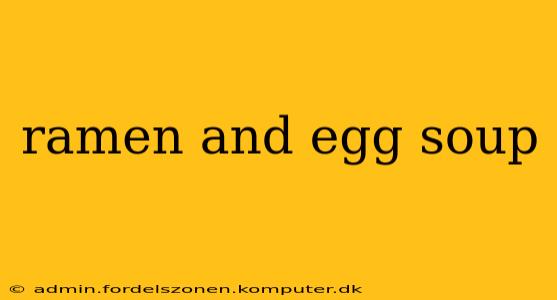Ramen and egg soup, while seemingly simple, offers a world of flavor and texture variations. This comforting dish, a staple in many Asian cuisines, transcends the basic broth-noodle-egg combination, blossoming into a culinary experience that’s both satisfying and adaptable. Let's explore the delightful depths of this seemingly simple soup.
What Makes Ramen and Egg Soup So Appealing?
The beauty of ramen and egg soup lies in its simplicity and versatility. The rich, savory broth, the chewy noodles, and the perfectly cooked egg create a symphony of textures and tastes. It's a dish that's easily customizable, allowing you to tailor it to your preferences and dietary needs. Whether you prefer a rich, pork-based broth or a lighter, vegetarian option, the foundation remains adaptable to your culinary desires. The umami richness is often further enhanced with additions like soy sauce, mirin, and other aromatics.
What Kind of Eggs Are Best for Ramen and Egg Soup?
The type of egg used significantly impacts the overall experience. While any egg will work, certain types offer superior results:
- Soft-boiled eggs: These are the most popular choice, offering a creamy, runny yolk that perfectly complements the broth. The yolk adds richness and creaminess to each spoonful.
- Hard-boiled eggs: For those who prefer a firmer texture, hard-boiled eggs provide a satisfying chewiness and a concentrated flavor. Slicing them adds visual appeal.
- Ajitsuke Tamago (Marinated Eggs): These sweet and savory marinated eggs are a true culinary delight, adding a complex depth of flavor that elevates the soup to another level. The marination process typically involves soy sauce, mirin, sake, and sugar.
How Long Should You Boil an Egg for Ramen?
The ideal boiling time depends on your preferred yolk consistency:
- Soft-boiled (runny yolk): 6-7 minutes
- Medium-boiled (slightly runny yolk): 8-9 minutes
- Hard-boiled (firm yolk): 10-12 minutes
Remember to immediately plunge the eggs into ice water after boiling to stop the cooking process and prevent a green ring around the yolk.
What Broth is Traditionally Used in Ramen and Egg Soup?
While many variations exist, traditional ramen broths often form the base for this soup. Popular choices include:
- Tonkotsu (pork bone broth): This rich and creamy broth is simmered for hours, resulting in a deeply flavorful and decadent soup.
- Shio (salt broth): A lighter and cleaner broth, often featuring a delicate balance of salt, chicken, and seafood.
- Shoyu (soy sauce broth): A savory and umami-rich broth, featuring a prominent soy sauce flavor.
- Miso (miso paste broth): This fermented soybean paste adds a deep, earthy, and slightly sweet flavor to the broth.
Vegetarian options are also readily available, often using vegetable stocks or kombu (kelp) for a savory, umami-rich base.
Can I Use Chicken Broth Instead of Ramen Broth?
Yes, absolutely! Chicken broth makes an excellent substitute, offering a lighter yet still flavorful base. You can enhance the chicken broth by adding soy sauce, mirin, or other aromatics to mimic the depth of flavor found in traditional ramen broths.
What Noodles Are Best for Ramen and Egg Soup?
While fresh ramen noodles are ideal, dried ramen noodles are a convenient alternative. Look for noodles specifically labelled for ramen, as they are typically thicker and sturdier than other types of noodles. The thicker noodles hold up better in the broth and provide a satisfying chew.
Are There Any Variations or Regional Differences in Ramen and Egg Soup?
Yes! Ramen and egg soup enjoys diverse regional interpretations, influenced by local ingredients and culinary traditions. For example, variations might include different types of protein, vegetables, or added spices. Some variations even feature regional specialties like a particular type of tofu or a specific type of mushroom.
Conclusion: A Culinary Journey Awaits
Ramen and egg soup is more than just a simple meal; it's a journey of flavor and texture, a canvas for culinary creativity. Whether you're a seasoned chef or a novice cook, this dish is both accessible and rewarding, offering countless opportunities for experimentation and enjoyment. So, grab your ingredients, and embark on your own ramen and egg soup adventure!
